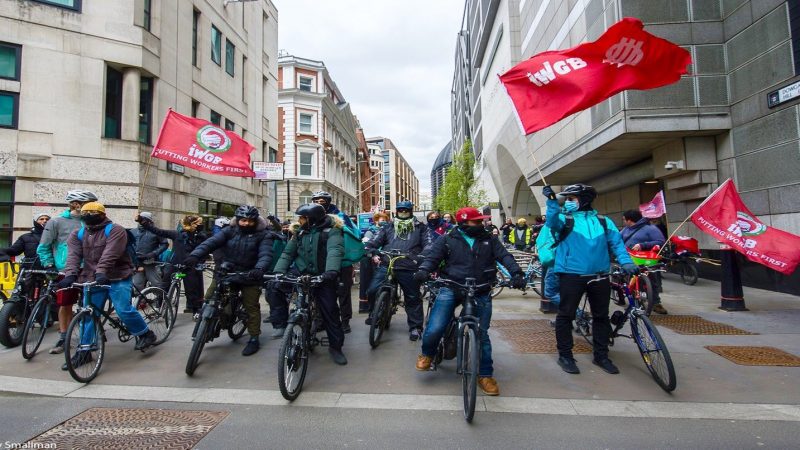The independent workers’ union continues seven-year dispute with delivery giant

Deliveroo is being taken to court, again, by the Independent Workers’ Union of Great Britain (IWGB) who are challenging the company’s refusal to recognise couriers’ right to collective bargaining.
This follows over seven years of legal disputes between the delivery giant and IWGB, with the latest appeal taking place today and tomorrow in the Supreme Court.
The union is seeking couriers’ rights to collective bargaining, and therefore the right to negotiate improvements to all aspects of their working life, in particular pay, hours and holiday.
If the union were to win the case, Deliveroo workers would still be categorized as self-employed, but they would have the right to negotiate over wages and to form trade unions.
It would also set a precedent for collective bargaining rights across the gig economy and ensure they have both basic worker rights and flexibility.
The court case marks almost a year since the GMB union and Deliveroo signed a recognition agreement together last May.
Seen as ‘historic’ at the time, Deliveroo had previously refused to negotiate with a union on pay or working conditions, despite repeated calls and court cases from IWGB to do so.
The voluntary agreement covered more than 90,000 self-employed riders and was heralded as ‘the first of its kind in the world’ by GMB.
However, IWGB condemned the partnership as a ‘cynical PR move’ saying it still failed to allow riders to negotiate over pay.
As it is a partnership, IWGB said the deal falls outside of tradition trade union agreements, as doesn’t involve formal bargaining powers and notably excludes pay from negotiations.
IWGB has also claimed that the agreement fails to address numerous problems with Deliveroo’s employment practices, like lack of basic rights such as holiday pay and pensions, and tackling unpaid restaurant waiting times, which they cite as the cause of riders’ low pay.
They called out Deliveroo’s claims that they will negotiate over certain conditions as standing in stark contrast to the status of their riders as self-employed, which prevents them from any entitlement to collective bargaining rights.
In 2017, Deliveroo won the right not to give its couriers the minimum wage or holiday pay, following a ruling that deemed riders as self-employed, rather than workers.
IWGB began organising with Deliveroo couriers around pay, precarity and safety back in 2016.
Alex Marshall, IWGB president, wrote on Twitter that the union will, “continue to fight Deliveroo in the courts and on the streets until workers have won what they need.”
He added: “Our members demand better pay, better rights and better safety!
“Flexibility AND rights is possible and we will not stop until we have won both!”
Results of the court proceedings, which take place today and tomorrow, will be released in about a month.
Deliveroo was approached for comment.
Hannah Davenport is trade union reporter at Left Foot Forward
(Photo credit: Independent Workers’ union)
Left Foot Forward’s trade union reporting is supported by the Barry Amiel and Norman Melburn Trust

To reach hundreds of thousands of new readers we need to grow our donor base substantially.
That's why in 2024, we are seeking to generate 150 additional regular donors to support Left Foot Forward's work.
We still need another 117 people to donate to hit the target. You can help. Donate today.



